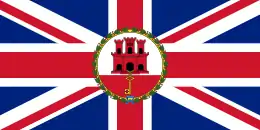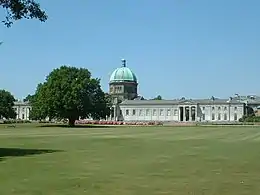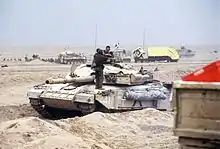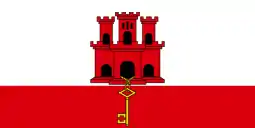John Chapple (British Army officer)
Field Marshal Sir John Lyon Chapple, GCB, CBE (born 27 May 1931) is a retired British Army officer who served as Chief of the General Staff, the professional head of the British Army, from 1988 to 1992. Early in his early military career he saw action during the Malayan Emergency and again during the Indonesia–Malaysia confrontation and later in his career he provided advice to the British Government during the Gulf War.
Sir John Chapple | |
|---|---|
| Born | 27 May 1931 |
| Allegiance | United Kingdom |
| Service/ | British Army |
| Years of service | 1950–92 |
| Rank | Field Marshal |
| Commands held | Chief of the General Staff Land Forces Commander British Forces in Hong Kong Gurkha Field Force 1st Battalion, 2nd Gurkha Rifles |
| Battles/wars | Malayan Emergency Indonesia–Malaysia confrontation |
| Awards | Knight Grand Cross of the Order of the Bath Commander of the Order of the British Empire |
| Other work | Governor of Gibraltar (1993–95) |
| Viceregal styles of Sir John Chapple (1993–1995) | |
|---|---|
 | |
| Reference style | His Excellency |
| Spoken style | Your Excellency |
Army career

Born the son of C. H. Chapple and educated at Haileybury College,[1] Chapple undertook National Service and was commissioned as a second lieutenant in the Royal Artillery on 3 June 1950.[2] He went to Trinity College, Cambridge in October 1951[3] and, while still at University, was transferred to the King's Regiment as a second lieutenant on 4 December 1952,[4] and to the South Lancashire Regiment also in the same rank on 20 October 1953.[5] He became a lieutenant in the South Lancashire Regiment on 27 May 1954[6] and, on leaving University, was transferred to the 2nd King Edward VII's Own Gurkha Rifles (The Sirmoor Rifles) on 3 August 1954[7] retaining his rank as a lieutenant.[8]
Chapple served with the regiment in Malaya, Hong Kong and Borneo.[1] He was promoted to captain on 9 February 1957[9] and to major on 9 February 1964.[10] Appointed a Member of the Order of the British Empire in the Queen's Birthday Honours 1969[11] and promoted to lieutenant colonel on 31 December,[12] he was appointed Commanding Officer of the 1st Battalion, 2nd Gurkha Rifles in 1970[1] and made a member of the Directing Staff at the Staff College, Camberley in 1972.[1] After spending much of the year as a services fellow at Fitzwilliam College, Cambridge in 1973, he was posted to the Directorate of Staff Duties at the Ministry of Defence at the end of the year[13] and, having been promoted to colonel on 31 December 1973[14] and to brigadier on 31 December 1975,[15] was made Commander of the Gurkha Field Force in 1976.[1] He became Principal Staff Officer to the Chief of the Defence Staff in 1978,[1] and having been appointed a Commander of the Order of the British Empire in the Queen's Birthday Honours 1980,[16] he became Commander of British Forces in Hong Kong on 13 June 1980,[17] with the substantive rank of major general from 1 January 1981.[18] He returned to the United Kingdom to be Director of Military Operations at the Ministry of Defence on 19 October 1982.[19]

Appointed a Knight Commander of the Order of the Bath in the Queen's Birthday Honours 1985,[20] he became Deputy Chief of the Defence Staff (Programmes and Personnel) on 2 January 1985 in the rank of lieutenant general[21] and was then was promoted to the rank of general from 29 June.[22] He was appointed as Commander-in-Chief, United Kingdom Land Forces at about the same time. He was appointed Aide-de-Camp General to the Queen on 6 October 1987[23] and advanced to a Knight Grand Cross of the Order of the Bath in the Queen's Birthday Honours 1988.[24] His last appointment was as Chief of the General Staff from 10 September 1988.[25] He served in this post, in which he provided military advice to the British Government on the conduct of the Gulf War, until he retired with promotion to field marshal on 13 February 1992.[26]
He was appointed Colonel of the 2nd King Edward VII's Own Gurka Rifles (The Sirmoor Rifles) on 14 September 1986,[27] and Honorary Colonel of the Oxford University Officers Training Corps on 21 July 1987.[28]
Later career
He was also a trustee of the Gurkha Museum from 1973 to 2003, a trustee of the National Army Museum from 1981 to 2003, a trustee of the World Wildlife Fund UK from 1988 to 1993, President of the Zoological Society of London from 1992 to 1994 and Governor of Gibraltar from 1993 to 1995.[1]
Personal life
In 1959 Chapple married Annabel Hill; they have one son and three daughters.[1] Their eldest daughter is Rachel Lucy Chapple, a social anthropologist.[29] Their son is David Charles Lyon Chapple, a consultant orthopaedic and spinal surgeon.[30]
His interests include military history.[1]
See also
References
- Who's Who 2010, A & C Black, 2010, ISBN 978-1-4081-1414-8
- "No. 38967". The London Gazette (Supplement). 14 July 1950. p. 3616.
- Heathcote, Anthony p. 85
- "No. 39877". The London Gazette (Supplement). 2 June 1953. p. 3103.
- "No. 40041". The London Gazette (Supplement). 11 December 1953. p. 6801.
- "No. 40183". The London Gazette (Supplement). 25 May 1954. p. 3129.
- "No. 40265". The London Gazette (Supplement). 27 August 1954. p. 5002.
- "No. 40268". The London Gazette (Supplement). 31 August 1954. p. 5064.
- "No. 40995". The London Gazette (Supplement). 5 February 1957. p. 869.
- "No. 43241". The London Gazette (Supplement). 7 February 1964. p. 1260.
- "No. 44863". The London Gazette (Supplement). 6 June 1969. p. 5966.
- "No. 45013". The London Gazette (Supplement). 5 January 1970. p. 216.
- Heathcote, Anthony p. 86
- "No. 46174". The London Gazette (Supplement). 7 January 1974. p. 267.
- "No. 46773". The London Gazette (Supplement). 29 December 1975. p. 16369.
- "No. 48212". The London Gazette (Supplement). 13 June 1980. p. 6.
- "No. 48511". The London Gazette (Supplement). 2 February 1981. p. 1561.
- "No. 48574". The London Gazette (Supplement). 6 April 1981. p. 5046.
- "No. 49156". The London Gazette (Supplement). 1 November 1982. p. 14262.
- "No. 49969". The London Gazette (Supplement). 31 December 1984. p. 2.
- "No. 50013". The London Gazette. 21 January 1985. p. 871.
- "No. 51009". The London Gazette (Supplement). 27 July 1987. p. 9574.
- "No. 51080". The London Gazette (Supplement). 5 October 1987. p. 12383.
- "No. 51365". The London Gazette (Supplement). 10 June 1988. p. 2.
- "No. 51467". The London Gazette (Supplement). 12 September 1988. p. 10255.
- "No. 52834". The London Gazette (Supplement). 14 February 1992. p. 2582.
- "No. 50663". The London Gazette (Supplement). 22 September 1986. p. 10234.
- "No. 51009". The London Gazette (Supplement). 27 July 1987. p. 9573.
- ""Welcome" by Rachel Chapple, PhD (Founder, Real Stories Gallery Foundation (501c) & www.real-stories-gallery.org)". Real Stories Gallery. Archived from the original on 31 July 2013. Retrieved 18 December 2011.
- "Tributes paid to boy killed in polar bear attack (From Salisbury Journal)". Salisburyjournal.co.uk. 6 August 2011. Retrieved 18 December 2011.
Further reading
- Heathcote, Tony (1999). The British Field Marshals 1736–1997. Barnsley (UK): Pen & Sword. ISBN 0-85052-696-5.
| Military offices | ||
|---|---|---|
| Preceded by Sir Roy Redgrave |
Commander of British Forces in Hong Kong 1980–1982 |
Succeeded by Sir Derek Boorman |
| New title | Deputy Chief of the Defence Staff (Programmes and Personnel) 1984–1987 |
Succeeded by Sir David Parry-Evans |
| Preceded by Sir James Glover |
Commander in Chief, UK Land Forces 1987–1988 |
Succeeded by Sir Charles Huxtable |
| Preceded by Sir Nigel Bagnall |
Chief of the General Staff 1988–1992 |
Succeeded by Sir Peter Inge |
| Government offices | ||
| Preceded by Sir Derek Reffell |
Governor of Gibraltar 1993–1995 |
Succeeded by Sir Hugo White |
